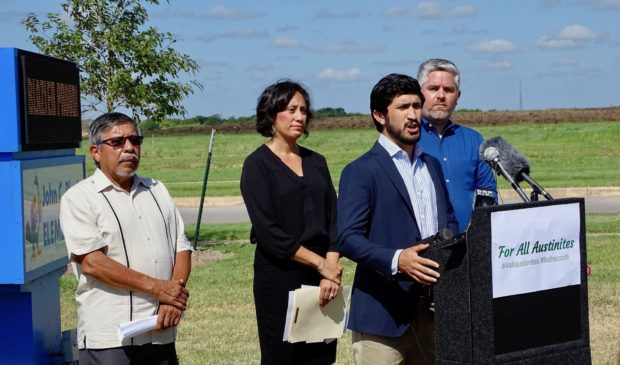Council members call for CodeNEXT changes
Wednesday, August 23, 2017 by
Nina Hernandez Just as the sun was beginning to glare down on the stretch of lawn around the welcome sign to Blazier Elementary School yesterday morning, a group of four City Council members kicked off what they are calling the #FixtheCode #4AllAustinites campaign. During the short press conference, the Council members called for more community engagement and a renewed focus on combating gentrification and economic segregation in the CodeNEXT process.
Council members Pio Renteria, Jimmy Flannigan, Delia Garza and Greg Casar worked together to organize the event. It precedes the second draft of the Land Development Code rewrite, which, as we noted yesterday, drops next month.
“We will not vote in favor of a code that continues to do all these things that we think the current code is doing,” Garza said at the conference. “We didn’t see a significant enough change in this first draft and, in fact, it kind of set up a system where there were still two Austins in a lot of ways.”
Flannigan said he agreed with Garza that there are big issues with the code that Austinites see in their neighborhoods on a daily basis. He referenced his own District 6 and the negative effects of sprawl.
“The code is broken in small ways too, in ways that we don’t always see,” Flannigan said. “The complexity of this code exacerbates our affordability issues and it only gives access to the privileged few who have the time, money and lobbyists to understand it.”
A Tuesday press release lays out a set of what it calls values that the group wants to guide the second draft. Those values are combating gentrification, promoting economic and racial integration, creating a more “people-centric” permitting process, a renewed focus on flood mitigation and wildfires, and the creation of an affordability metric. They would also like the CodeNEXT team to remain on schedule and meet the current deadlines.
Flannigan told the Austin Monitor that the message is directed at Austinites, who he said are desperately needed in the process going forward.
“It’s saying to the community: We’re hearing some voices at City Hall, but we’re not hearing all voices at City Hall,” he said. “And the four of us represent districts that, for a variety of reasons, face barriers to participation.”
He continued, “So we’re saying to the community that the process that we’ve led to, the negative things that you’ve heard about it, we agree. We need to have a better code. We need to fix this code, and it needs to be fixed for all Austinites – not just the ones that show up at City Hall.”
In response to a question about the recent revelation that most of the online comments on the CodeNEXT draft are about Central Austin, Casar said that doesn’t necessarily reflect who is engaging with CodeNEXT.
“(My constituents) know that it’s largely the more affluent neighborhoods that are fighting development and pushing it on other communities,” he said. “And we are here speaking from that vantage point. So I think there has been engagement from Council members here. Those voices have been raised, and we’ve heard those voices. And just because folks aren’t getting onto the Planning and Development website doesn’t mean that those folks don’t matter. It just means the Planning and Development staff and the Planning and Development system are still enshrined in an old way of doing things that we’re talking about shaking up.”
Planning and Zoning Department Director Greg Guernsey told the Monitor that CodeNEXT is based on existing policy, and therefore a change in the direction of the project would require a full vote of Council. “We appreciate the Council members sharing their and their constituents’ concerns about the current draft, and we are using feedback from the Austin community to improve our second draft,” he said.
Guernsey noted the team has been following a Council-approved engagement process on the first draft. That involved – as regular Monitor readers can attest – district meetings, online feedback, Central Austin office hours, library office hours and materials in Spanish. Once the next draft is released on Sept. 15, Guernsey said, the CodeNEXT website will be updated to include dates for further public engagement.
This story has been updated to clarify that CodeNEXT is based on existing policy, and not yet existing policy. Photo courtesy of Austin City Council District 6. Photos shared by District 6 are protected under the terms of the Creative Commons Attribution-ShareAlike 4.0 International (CC BY-SA 4.0) license.
The Austin Monitor’s work is made possible by donations from the community. Though our reporting covers donors from time to time, we are careful to keep business and editorial efforts separate while maintaining transparency. A complete list of donors is available here, and our code of ethics is explained here.
You're a community leader
And we’re honored you look to us for serious, in-depth news. You know a strong community needs local and dedicated watchdog reporting. We’re here for you and that won’t change. Now will you take the powerful next step and support our nonprofit news organization?






